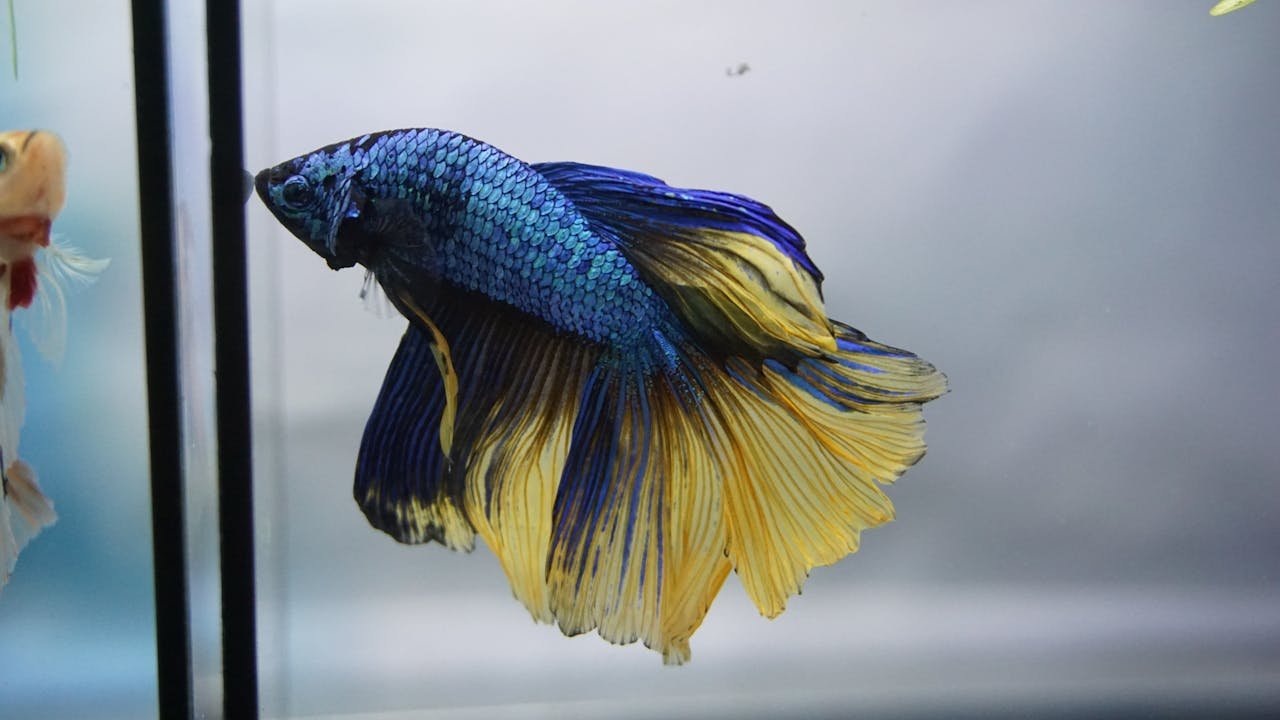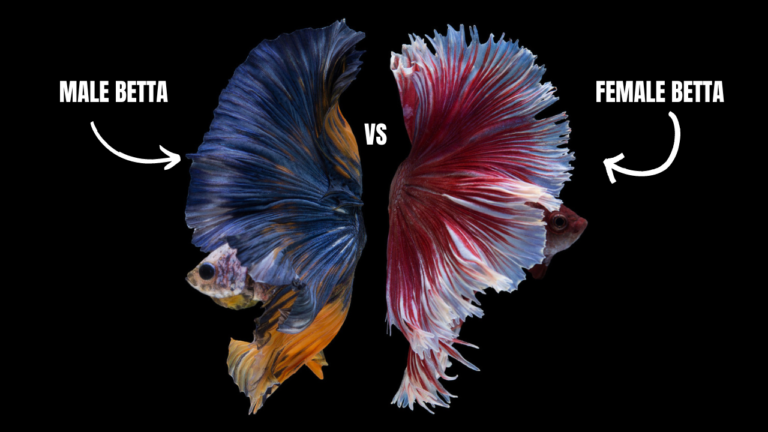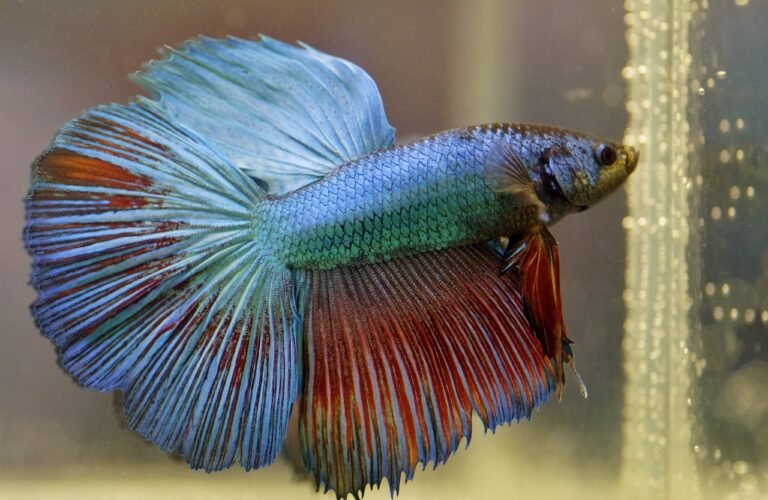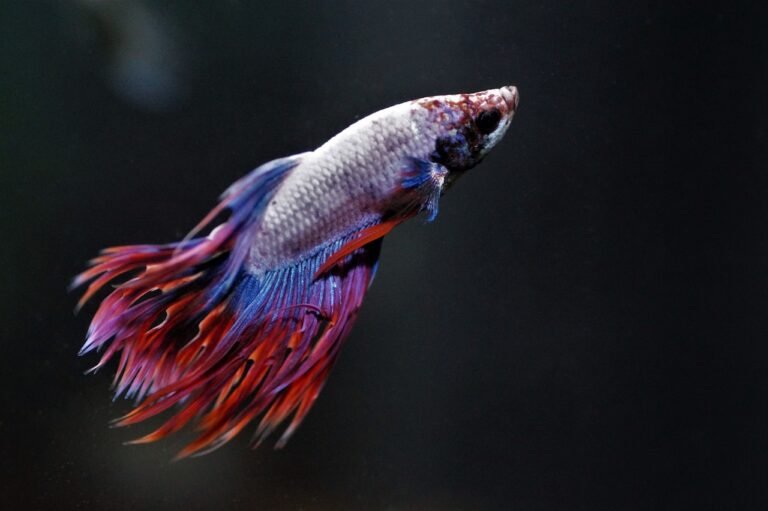When our lovely pet gets sick, as a betta fish owner this is the type of situation that worries us the most. These lively and captivating creatures need you to give them the right care and attention for their well-being. Keeping them healthy and being aware about their health are necessary for their happiness and long life.
This complete guide will help you learn about common health problems which can affect your betta fish and teach you how to detect different diseases effectively. From fin rot to dropsy or tumors, we will cover the symptoms, causes as well as treatments for each condition so that you may be empowered in taking steps towards bringing back life into your fish.
Common health issues in betta fish
Like any other living organism, a betta fish can have various health issues. 5 most frequent examples of diseases include:
- Fin rot
- Dropsy
- Tumors
- Bacterial infections
- Parasitic infestations
Knowing these conditions’ signs is important since it helps one identify them early enough thus treating them immediately. By observing what surrounds them while at the same time taking precautionary measures; then there will be great improvement towards full recovery plus maintaining good health always.
Understanding fin rot in betta fish
Fin rot refers to a bacterial infection that affects the fins and tail of a betta fish. This is among the most common illnesses faced by these beautiful creatures. The disease shows itself through:
- Shred or disintegrating edges on fins.
- Whitish/red discoloration on fins.
- Bloody or tattered appearance of fins.
If left untreated, fin rot can quickly spread throughout all parts of its body resulting into total destruction of fins hence endangering its life.
Treating fin rot in betta fish
You must act fast when dealing with this sickness so as to save your bettas’ lives.Here are some steps which should be followed:
Partial water change: Remove around 25-30% tank water and replace it with fresh dechlorinated one; this will help dilute any harmful bacteria or toxins that may be present within the tank.
Increase temperature of water: Raise slowly up to about 80-82°F (26,7-27,8°C); warmer waters can aid in strengthening the immune system of a betta thus speeding up the healing process.
Give medicine: There exist different kinds of drugs for curing fin rot such as antibiotics or antifungal treatments; you should follow instructions correctly while making sure they finish the entire course treatment.
Create stress-free surroundings: Reduce outside factors like noise pollution or bright lights which might hinder quick recovery by distracting them from focusing on getting better.
Check progress: Keep observing their fins closely and continue doing necessary until when fin rot clears completely through performing more frequent changes of water coupled with administration of additional doses of medication if need arises.
Remember that patience together with consistency forms part & parcel during the treatment process against this disease. With proper care shown towards them, they will regain their previous healthy condition as soonest possible thereby making your bettas’ fins appear vibrant again.
Identifying and treating dropsy in betta fish
Dropsy is a severe illness affecting these fish. It is characterized by bloatedness or swelling around its belly area often accompanied with raised scales that look similar to pine cones. Other signs may include:
- Loss of appetite
- Lethargy
- Fast breathing rate
- Bulging eyes
This condition can be caused by different things including bacterial infection, organ failure among others internal parasites too.
Treating dropsy in betta fish
If you suspect your betta fish has dropsy, take immediate action. Here is what you can do:
• Isolate your betta: Transfer the sick betta into a separate clean quarantine tank to prevent possible infection transmission.
• Medication with antibiotics: Consult a knowledgeable aquarium specialist or veterinarian on best antibiotics for curing dropsy and follow dosage instructions properly.
• Frequent water changes: Do partial water changes every 1-2 days to keep the quality of water at its optimum level and get rid of accumulated waste materials or toxins.
• Provide stress-free environment: Reduce external stressors and keep the quarantine tank dimly lit and quiet so as to aid healing.
• Offer easily digestible foods: Feed your betta small amounts of high-quality easily digestible food such as boiled peeled peas or freeze-dried daphnia.
Though it might be difficult to treat dropsy, early intervention alongside consistent care could increase chances for recovery of your betta fish.
Dealing with tumors in betta fish
Tumors are abnormal growths which may appear on any part (external organs, fins) or inside the body of a betta fish. They can be caused by among other things genetics, environmental toxins; viral infections etcetera. Some types include;
- Lymphocystis (cauliflower-like growths)
- Fibrosarcoma (fleshy irregular masses)
- Lipoma (fatty lumps)
While some tumors are benign others might be malignant thus life-threatening.
Treating tumors in betta fish
Unfortunately there is no cure-all treatment for tumors in these species. However here are few steps to give them good care:
Quarantine Your Betta – Separate an ill individual from other fishes so that they do not catch any potential infection while also reducing their anxiety levels through isolation.
Maintain Optimal Water Quality – Regular water changes need to be done coupled with close monitoring of parameters so as to ensure a clean healthy environment.
Provide Stress-Free Environment – Dimming lights or keeping the room quiet can help reduce additional stressors on your betta fish especially if there is loud noise around it.
Consider Surgical Removal – Some benign tumors may require being cut out by a vet specialized in aquatic animals but this should be weighed against risks involved vis-à-vis benefits expected from such undertaking.
Supportive Care – Feeding easily digestible foods plus adding supplements or recommended medications for overall health improvement are some examples of auxiliary measures that one could take under advice from professionals.
It is not easy dealing with tumors however creating an environment free from stress while also providing optimal care might slow down their growth rate thus enhancing quality life for these creatures.
Analyzing betta fish poop for signs of illness
The waste produced by our pet betta fish can tell us more about its health than we think. By observing the excrements of your Siamese fighting fish, you may detect problems earlier and prevent them from worsening too much thus saving their lives eventually.
Healthy betta fish poop
- A healthy poop should be:
- • Firm and well-formed
- • Dark brown or reddish-brown in color
- • Easily visible, sinking to the bottom of the tank
Abnormal betta fish poop and what it means
If you notice any of the following signs, it could indicate an underlying health issue:
- White or stringy poop: This could be a sign of internal parasites or a bacterial infection.
- Clear or transparent poop: This may indicate that your betta is not properly digesting its food, potentially due to digestive issues or a lack of nutrients.
- Excessive or frequent pooping: This could be a sign of stress, overfeeding, or internal parasites.
- Bloody or mucus-like poop: This could indicate internal bleeding or a bacterial infection and should be addressed immediately.
By regularly monitoring your betta’s poop, you can catch potential health issues early and take appropriate action to address them.
Recognizing signs of a sick betta fish – vertical death hang and swimming sideways
No matter how attentive a betta fish keeper you are, there may come a time when your beloved pet starts showing worrisome behaviors or symptoms. Two such signs that should never be ignored are hanging vertically (also known as “vertical death hang”) and swimming sideways.
Vertical death hang
A vertical death hang occurs when the betta fish hangs vertically in water, either head up or head down, without moving much if at all. This could mean that the fish is under extreme stress due to illness, or even close to dying from some serious condition. Possible causes include:
- Ammonia/nitrite poisoning
- Lack of oxygen in the tank
- Failure of internal organs
- Bacterial/parasitic infections within the body
If you see this behavior from your betta, take immediate action by changing water; testing for ammonia levels; seeking professional help where necessary among other things.
Swimming sideways
Internal injury/deformity caused by physical trauma such as bumping into objects or being bitten during fights with tank mates etcetera…
Neurological problem leading to loss of balance/control over muscles required for normal movements including swimming straight forward/backward etcetera…
Bacterial/parasitic infection attacking tissues around organ systems responsible for balancing thus affecting ability to swim normally etcetera…
In case your betta is swimming sideways, keep an eye on your betta fish behavior and check water parameters frequently. It might be necessary to involve a specialist who will provide appropriate treatment or medication because the situation could either remain unchanged or deteriorate further.
Steps to nurse a sick betta fish back to health
Once you have noticed that your betta fish is unwell, it’s important to act immediately so as to increase chances of recovery. The following are steps involved in nursing back sick bettas:
Quarantine the sick fish: Isolate the infected individual from other tank mates and transfer them into a separate clean container for observation.
Carry out partial water change: In the quarantine tank, replace about one quarter of the water with fresh dechlorinated tap water at the same temperature as before.
Test for water quality: Use a reliable testing kit to measure levels of ammonia, nitrite, nitrate, pH and temperature in the quarantine tank. Adjust accordingly for optimal conditions.
Create a stress-free environment: Dim lights around aquariums while keeping noise levels low so that all fish can rest without any disturbance especially those which appear sickly.
Administer drugs/medication: Depending on specific condition presented by different individuals among bettas; consult experienced aquarist or vet for advice on proper drug(s) use/dosage instructions etcetera…
Feed easily digestible food types: Provide small amounts (less than normal) of highly nutritious yet easy-to-digest meals like boiled peeled peas or freeze dried daphnia etcetera…
Monitor & adjust treatment plan: Pay close attention to changes exhibited by each affected individual during the treatment process thereby modifying approaches where necessary until signs improve significantly.
Regularly change some water portions according to prescriptions given; this should be done every two-three days (48 hours – 72 hours) until full recovery is observed.
Don’t forget that nursing a poorly betta fish requires patience, commitment and preparedness to give proper care. A well-treated and stress-free environment can help your lovely betta back to its full strength.
Preventive measures for maintaining a healthy betta fish
It is equally important to know how to handle health problems when they come up as well as to take preventive measures for maintaining healthy thriving bettas. Here are several key steps:
Provide a suitable environment – Make sure that your bettas’ tanks are of right size fitted with heaters and filters having been installed correctly so that best water quality plus temperature levels may be maintained throughout. Carry out regular partial changes – Establish consistent routine concerning half water replacements meant for taking out wastes while adding fresh dechlorinated water back into the tank.
Give a balanced diet – Feed them good quality foods which should be mixed up like pellets, freeze dried ones as well occasional live or frozen treats too. Monitor the following: ammonia, nitrite, nitrates, pH and temperature levels in water; make necessary adjustments where necessary. Quarantine all new fish – Before putting any new fish together with plants into your aquarium, ensure they undergo a quarantine process first to prevent introduction of parasites plus diseases that might affect other occupants later on. Do not overcrowd – Keep appropriate stocking densities within tanks since overpopulation can result in stressed fish thus more vulnerable to diseases.
Provide hiding spots enriched by natural elements such as plants decorations etc so that it creates a stimulating environment for betta where relevant behaviors will be exhibited while reducing stress levels also at same time.
By doing this you will minimize chances of sickness occurring while maximizing the lifespan of your bettas
Always recall that prevention is very vital in taking care of a healthy betta fish. This can be achieved by creating an appropriate habitat, feeding it with a well-balanced diet as well as monitoring the water parameters so that diseases are prevented.
In case you notice any signs that indicate illness in your betta fish don’t hesitate to consult professionals like aquarium specialists or veterinarians who have knowledge about them. It is possible for one to bring back their sick betta fish into good health again through being patient, consistent and giving them the best possible care which will also make such pets live longer while decorating our tanks with different colors.
If you need high-quality supplies for your bettas, medications or want some advice from experts then check out our guide on betta fish care ! We have explained an added useful information on how one can take care of these fish better than before.
What to do if your betta fish dies
There might be times when no matter what you do, the betta fish gives in to sickness or old age. Losing a pet is never easy; thus it is important that we handle such situations with appropriate measures and respect.
Removal and disposal: Use a net or container to gently remove the dead betta from the tank. Dispose of its body properly; either bury it or wrap it with biodegradable material before throwing it into the trash can.
Clean the tank thoroughly: Carry out complete water change together with deep cleaning of the tank, scrubbing away any uneaten food, waste or debris. Disinfect the tank as well as all equipment used so far in order to prevent spread of any potential diseases or infections.
Reflect and grieve: Take some time off and think about those good moments which were brought by having a betta fish around. Mourning over pets’ death is a natural process towards acceptance.
Get another Betta: Once you have gone through this loss plus finished doing a good cleaning job for your tank; consider introducing another one into the aquarium setup.
Nevertheless, losing a beloved pet can be devastating but always remember that during their lifetime you gave them the best possible care they deserved hence provided the most loving environment ever.
Winding Up !
Caring for a sick betta fish can be a challenging and emotionally taxing experience, but with the right knowledge and dedication, you can increase their chances of recovery. By understanding common health issues, recognizing concerning symptoms, and taking prompt action, you can provide your beloved pet with the best possible care.
Remember, prevention is key to maintaining a healthy betta fish. By creating a suitable environment, offering a balanced diet, and monitoring water parameters, you can minimize the risk of illness and ensure your betta thrives.
If you ever find yourself in a situation where your betta fish is unwell, don’t hesitate to seek professional advice from knowledgeable aquarium specialists or veterinarians. With patience, consistency, and a commitment to providing the best care, you can nurse your sick betta fish back to health and enjoy their vibrant presence in your aquarium for years to come.







